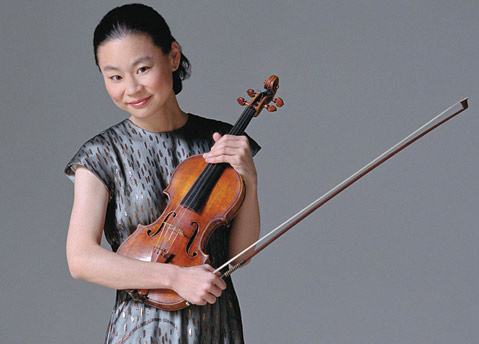Midori Interview
Violinist Midori Gotō to Play at Music Academy of the West

Midori Gotō — known professionally simply as Midori — is such a perfect fit for the Music Academy of the West that it’s surprising to learn her residency there, which includes solo recitals on Monday, July 29, and Wednesday, July 31, will be her first. In the public eye since her early teens, Midori is a child prodigy turned master musician and committed teacher. As head of the University of Southern California’s Thornton School of Music strings department for the past five years, she has divided her time between her students, her administrative responsibilities, and a still-busy touring schedule. Via email from Asia, Midori recently answered some questions about her life and career.
Given how busy you are, why did you decide to spend part of your summer here? This is my first visit to the Music Academy, and I am excited to be coming for both the performances and the interactions with the young musicians. It’s always wonderful to have the opportunity to work with the musicians! Teaching is so inspiring for me, and time finds itself to make it possible for me to work with these young musicians. Students are so full of aspirations and passion for their art, and in many cases, their dedication to setting and achieving goals for themselves helps me remain highly engaged and motivated in life.
You will be performing the complete Bach partitas and sonatas — quite an undertaking. Do you view Bach as the bedrock of classical music, the foundation for all that follows? Yes, Bach is certainly one of the most foundational composers for musicians of all kinds. It is of no use for me to try to do justice in describing the pieces. There is something [about them] that is both elegantly simple and masterfully complicated, and they present incredible technical and expressive challenges.
As at USC, you will be working with some remarkable young musicians. Do you see your job as refining their technique, encouraging expressivity, or both? I believe that the situation is different for every student. Some students enter into a relationship with a teacher with a way of expressing a musical message that is already clear and natural, while others require more dedicated guidance to achieve these goals. Every player, from one who picks up an instrument for the very first time to a professional who has practiced every day for decades, has work to do to improve his or her technique. There are always new challenges that can be approached and met.
A recent Los Angeles Times profile of you noted that you get into your office around 6 a.m. most days, and referred to you as a “workaholic.” Is that a fair description? I never see it as being a workaholic! From the time I was very young, my family emphasized the necessity of dedication and a strong work ethic. These are values I have carried with me throughout my whole life. Of course, no work ethic would be enough without a love for the work itself. In truth, I have a great passion for everything that I do, from performing to teaching to outreach and education work.
Young people are increasingly open to all sorts of music, including classical, but so many orchestras are having serious financial problems. Are you optimistic or pessimistic about the future of this art form? I can’t pretend to know what will help struggling arts organizations to get back to a successful position, but I do believe that there will always be a need for classical music in the world. Today’s world is becoming faster and faster, and, in some ways at least, less connected. People can eliminate person-to-person interactions in favor of digital ones. There is something that music provides that technology cannot, and I believe that it helps to bring beauty into the world. While performing arts organizations and artists themselves may need to come up with creative new ways to function in order to succeed, the work that they do will always be vital.
4•1•1
Midori will perform all-Bach solo recitals at the Music Academy’s Hahn Hall on Monday, July 29, and on Wednesday, July 31, at 8 p.m. She will also give a public master class in the Academy’s Lehman Hall on Tuesday, July 30, at 3:15 p.m. For tickets and information, call 969-8787 or visit musicacademy.org.



